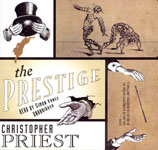

 The Prestige
The Prestige
By Christopher Priest; Read by Simon Vance
10 CDs – 12 Hours [UNABRIDGED]
Publisher: Blackstone Audio
Published: 2006
ISBN: 0786168412
Themes: / Science Fiction / Magic / Magicians / 19th Century / Electricity / World Fantasy Award /
It’s difficult to say how long it’s been since I’ve been so enthralled with an audiobook as I was with this unabridged version of the World Fantasy Award-winning The Prestige. In very few words, the production was excellent. Simon Vance narrated, and since the story is primarily told through journal entries of the two main characters, he was basically called upon to portray these two dark, intricate magicians. He unreservedly succeeded – his performance was stellar. Because of his subtle care, the surprises of the novel were enhanced by his reading. And there are many surprises.
The main characters are late 19th century stage magicians (or “prestidigitators”, as they call themselves) named Alfred Borden and Rupert Angier. They perform in London, but at the height of each magician’s popularity, they tour America and Europe. But not together. No, these two guys are mortal enemies, out to better the other by whatever means necessary. Each one in turn performs a trick on stage that seems impossible to the other, and their personal quests are rooted in finding out how the other does it, and then to perform it better.
The novel is filled with fascinating detail about these magicians and their tricks. But even more interesting are the journals themselves. It becomes quickly apparent that the journal writers are not reliable. Christopher Priest was masterful in the way he made sure that the journal writers were speaking squarely from their own point of view, which was not always technically true; rather, like journal writers everywhere, they would write something about their own motives that justified events to themselves. The result is an intricate web that is slowly unraveled throughout the book. It’s an audiobook that merits a second listen; knowing what I know now, having finished, a second listen would reveal the breadcrumbs I missed along the way. I suspect I left several on the trail.
Also prominent is Priest’s portrayal of life in the 19th century. The values, the language, and the daily life of the characters all feel accurate, though I am no 19th century historian. The world’s reaction to the advent of electricity is a fascinating example. I couldn’t help but to think of modern parallels with the advent of the internet.
At first glance, this novel is fantasy. It even won the World Fantasy Award in 1996. But is this a fantasy novel? It really isn’t. Yes, there are magicians here, but they are stage magicians. As such, their tricks have perfectly reasonable explanations. Each of the main characters do specific remarkable things, but the reasons given for the way these things work are not magical, but scientific. More, I will not say, because this is a novel to be discovered for yourself, not to be read about. After I finished the book, I watched the recent film version. Be assured that there are enough major differences that a listen to this book will be a different (though similar) and very worthwhile experience – worthwhile enough to be the latest addition to SFFaudio’s Essential List.
Audio Sample: LINK
Posted by Scott D. Danielson
A well performed reading of a novel SFF book. Vance does, indeed, put a great deal of nuance to the story’s unreliable narrators, deftly handling them, even as the characters age.
Is the book Fantasy? A tough question to ponder without talking about the plot in detail. It reminded me, in a way, of retro SFF. A story not just set in the Victorian Era, but written loosely with the style and kind of plotting that a period author might have created–something like HG Wells or Jules Verne might of thought of.
The slow revelation of the unreliability of the competing narrators is fabulously done, and convincingly so, almost to the point that I want to pin the author down and say “Who should I believe?”
However, one aspect I found unconvincing was the magicians shared inability to deal with hecklers or failed tricks. Within the limits of youth or massive failure, it is understandable, but in more common circumstances it is not. If there is one thing most magicians have in common, it is patter and or a routine to deal with such instabilities. The main characters are professional **performers** at the top of their profession, so this lacking in their ability cracks some of the verisimilitude the book otherwise creates so well.
Overall, though, a great reading of a good book.